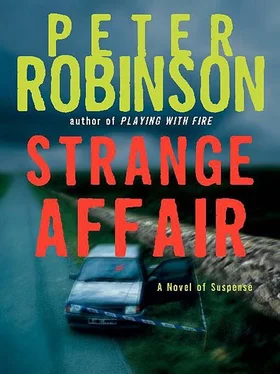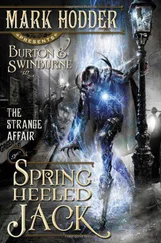“Yes. Shot. A twenty-two, by the looks of it.”
“Alan…?”
“He identified the body. Asked us to sit on the identity until he told his parents. He was pretty shaken up.”
“I can imagine. Poor Alan,” said Annie. “Is there anything I can do?”
“Not right now. He’s gone off to Peterborough. I just heard from him. He’s going to stay with his parents for a while. I just thought you should know.”
“Yes. Thanks, Dave. Bloody hell, what’s going on?”
“I wish I knew.”
The Banks family had been seeing Dr. Grenville down at the local health center for more than twenty years, since back when he had his own practice, and he was only too willing to pay a house call when Banks rang him and told him what had happened. A fussily neat man near retirement age, with salt-and-pepper hair and a matching mustache, he tut-tutted over Ida Banks before giving her a sedative and issuing a prescription for more, which Banks rushed down to the chemist’s to fill. He felt like taking one or two himself on his way back but resisted the temptation. He’d need a clear head over the next few days.
Ida Banks lay on the sofa, a small, lost figure covered with a blanket. She was mumbling, but she wasn’t making much sense, and after a while she drifted off. Banks offered a pill to his father, who gave him a look of distaste and declined. It had always been his way to face life’s harshness head-on, without a mask, and he wasn’t going to change.
“What do we do now?” he asked Banks. “I mean, aren’t there forms to fill in and such like?”
“Don’t worry, Dad. I’ll take care of it all down in London. Do you know if Roy left a will?”
“Will? Don’t know. He never said.”
“I’ll talk to his solicitor later. He’s in Roy’s phone book. I have to make a couple of calls right now. Can I use the phone? It’s important.”
“Go ahead. Make as many as you want.”
First Banks rang Tracy’s mobile. The last thing he wanted was his children finding out about their uncle’s murder from the television or newspapers.
“Dad, what’s up?”
“How are things going?”
“Fine. What’s wrong?”
“Does something have to be wrong for me to ring my own daughter?”
“You just sound funny, that’s all.”
“Well, you’re right this time. It is bad news, I’m afraid,” said Banks.
“What’s happened? Are you all right?”
“I’m fine,” said Banks. “It’s your Uncle Roy.”
“What about him? Is he in jail?”
“Tracy!”
“Well, you always seemed to think he’d end up there.”
“I’m sorry to have to be the one to tell you, but he’s dead.”
There was a moment’s silence at the other end, then Tracy’s voice came back on again, shaking a little. “Uncle Roy? Dead? Are you serious? An accident?”
“No. I’m sorry, love, but he was killed. I don’t know how to put it any better.”
“Killed how?”
There was no point trying to save her from the knowledge, Banks realized. She would soon find out from the newspapers. “He was shot. Murdered.”
“My God,” said Tracy. “Uncle Roy. Murdered.”
“It’ll be in the papers and on the TV,” Banks said. “I just wanted you to know first.”
“Is there anything I can do?”
“It’s under control. Just don’t talk to any reporters, if they track you down.”
“Do Grandma and Granddad want me to come and stay with them?”
“You get on with your studying. I’ll take care of them and I’ll try to come and see you soon. You can do me a small favor, though.”
“What?”
“Will you tell your mother?”
“Dad!”
“Please. Look, normally, I wouldn’t bother. They weren’t close or anything and she has her own life now. But it’ll be high-profile. Maybe the reporters will trace her, too. I don’t want it to come as too much of a shock to her.”
“Oh, all right. But this is silly. You’ve got to talk… Oh, never mind. I’m really sorry about Uncle Roy. I know… I mean, I know we didn’t see him often but he always sent really cool presents.”
“Yes,” said Banks. “I’ve got to go now. Keep in touch.”
“I will. I love you, Dad.”
Next Banks rang Brian, who didn’t answer. Banks left a message for him to ring as soon as he could, then phoned DI Brooke to thank him for his patience and give him the go-ahead to release Roy’s identity. Finally he rang Corinne. She sounded devastated after her initial stunned silence, and he wished he could be there for her, but all he could do was murmur useless words of comfort over the telephone as she cried. He promised to drop by next time he was in London, which he said would probably be soon.
He didn’t have Malcolm Farrow’s phone number, so that call would have to wait until he went back to Roy’s house. Then he realized he probably couldn’t go back there, as the whole place would be sealed off by the police investigating Roy’s murder. He hesitated, then he called Annie Cabbot on her mobile. She was on the line. Brooke would have already told her about Roy, so Banks just left a message asking her to give him a ring at Peterborough as soon as she could, then he went back to his mother and father.
“Would you close the upstairs curtains, Son?” Arthur Banks asked. “Your mother would want it that way.”
“Of course.” Banks remembered how, when he was younger, if someone in the family died his mother would always close the upstairs curtains.
Up in his old room again, Banks looked out over the backyards and the deserted alley to find that the council estate the builders had been working on during his last visit was now almost finished. Most of the houses were as yet unoccupied, and some were still without windows, but rows of them, all the same, filled the stretch of waste ground, where weeds used to grow over discarded tires and other rubbish. This was where he used to play football and cricket as a child, where he had his first kiss and first furtive feel of a girl’s breast as a teenager. He tried to remember whether Roy, too, had had such formative experiences there, but he didn’t know. Most likely, if he had, it had all happened after Banks had left home, when they hardly communicated.
He did remember one incident. When he was about thirteen and Roy eight, Banks saw an older, bigger boy of about ten or eleven bullying Roy out in the field. Poor Roy was in tears as the bigger boy punched him repeatedly in the stomach and jeered at him for being a weakling. Banks rushed over to stop it, and even though he knew that he was now the bully, he couldn’t hold himself back from giving the bastard a bloody nose and a split lip.
It came back to haunt him, too, he remembered, when the boy’s parents called at his house that night. Only because Roy corroborated his story in every detail did Banks get off with a mere admonishment to pick on people his own age in future. It could have been much worse. So he had stood up for Roy, and Roy had stood up for him. What had happened, then? What had come between them?
As he usually did on his infrequent visits home, Banks looked in the wardrobe where the boxes of his adolescence were stored. The last couple of times he had been back he had discovered a treasure trove of old records, comics, diaries, books and toys. There were even more boxes he hadn’t got around to yet, and he found himself wondering if any of them were Roy’s.
The toy box with the padlock was long gone, but he did eventually manage to dig out a cardboard box full of things that definitely weren’t his: Corgi toys – better than Dinkys, he remembered Roy arguing, because they had plastic windows and more realistic detail – a stamp album full of bright but worthless stamps, a portable chess set that folded into a box, a Scalextric set that Banks was never allowed to play with and several of those tiny submarines that came out of a cornflakes packet, the kind you stuffed with baking soda to make them submerge and surface. There were no diaries or old school reports, nothing to flesh out the vague sense of Roy that the toys implied, but down at the bottom was a Junior Driver, a toy steering wheel. Banks remembered Roy used to stick it on the dashboard on the passenger side of his father’s Morris Traveller whenever they went anywhere and pretend he was driving. Even back then Roy had been car-mad.
Читать дальше












